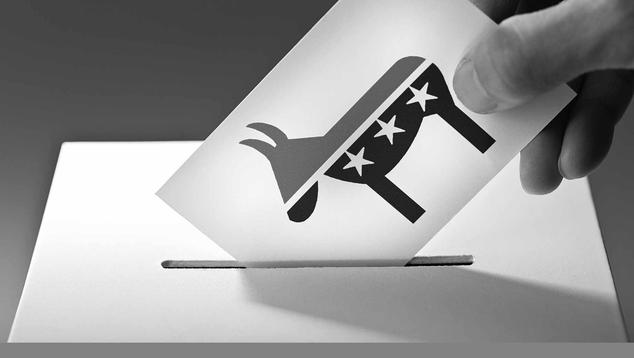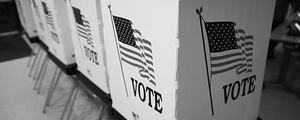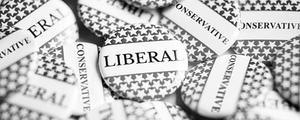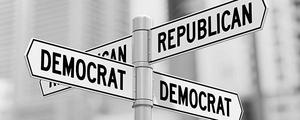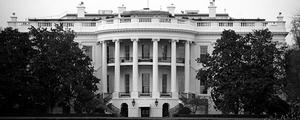How, or even whether, Democrats nationwide will vote if their party nominates someone they don't agree with looms over the Democratic nomination process as the field winnows to candidates with very different worldviews.
In November, Gallup found that a majority of Democrats (60%) would prefer to see their party nominate someone with the best chance of defeating President Donald Trump, even if that nominee does not share their views on key issues. This, however, leaves a sizable faction of Democrats (36%) for whom issue alignment is a more important voting factor than electability.
A casual glance at the Democratic primary polls for president reveals a fault line through the leading candidates, with centrist Democrats on one side and progressives on the other. Support for the more centrist or moderate Democrats in the race (Joe Biden, Pete Buttigieg, Michael Bloomberg) totals 41.4% among Democrats nationally in the latest RealClear Politics average, while progressive leaders Bernie Sanders and Elizabeth Warren total 35.6%.
Reflecting on the factional divisions within the Democratic Party, Ron Brownstein of CNN Politics said in December that "the principal components of the Democratic coalition are fragmenting, with such key demographic groups as whites with and without college degrees, African Americans and Hispanics all tilting toward different contenders." Brownstein also noted that Barack Obama in 2008 and Hillary Clinton in 2016 each won the nomination through coalitions of Democratic subgroups that have not yet coalesced this cycle.
Rep. Alexandria Ocasio-Cortez, an ardent Sanders supporter, may have said it best when she recently described the Democratic Party as being "too big of a tent."
"In any other country," Ocasio-Cortez said, "Joe Biden and I would not be in the same party, but in America, we are."
So, how hard will Democrats have to work between now and November to line up behind a single candidate? To understand where rank-and-file Democrats stand on the frontrunners, Gallup asked them in October 2019 whether they agree or disagree with Sanders, Warren and Biden on "the issues that matter most to you." Overall, the candidates fare about the same, with roughly seven in 10 Democrats agreeing with Biden and Sanders and just over six in 10 agreeing with Warren.
| Joe Biden | Bernie Sanders | Elizabeth Warren | |||||||||||||||||||||||||||||||||||||||||||||||||||||||||||||||||||||||||||||||||||||||||||||||||
|---|---|---|---|---|---|---|---|---|---|---|---|---|---|---|---|---|---|---|---|---|---|---|---|---|---|---|---|---|---|---|---|---|---|---|---|---|---|---|---|---|---|---|---|---|---|---|---|---|---|---|---|---|---|---|---|---|---|---|---|---|---|---|---|---|---|---|---|---|---|---|---|---|---|---|---|---|---|---|---|---|---|---|---|---|---|---|---|---|---|---|---|---|---|---|---|---|---|---|---|
| % | % | % | |||||||||||||||||||||||||||||||||||||||||||||||||||||||||||||||||||||||||||||||||||||||||||||||||
| Agree | 69 | 70 | 62 | ||||||||||||||||||||||||||||||||||||||||||||||||||||||||||||||||||||||||||||||||||||||||||||||||
| Disagree | 27 | 28 | 30 | ||||||||||||||||||||||||||||||||||||||||||||||||||||||||||||||||||||||||||||||||||||||||||||||||
| No opinion | 4 | 2 | 8 | ||||||||||||||||||||||||||||||||||||||||||||||||||||||||||||||||||||||||||||||||||||||||||||||||
| Gallup, Oct. 14-31, 2019 | |||||||||||||||||||||||||||||||||||||||||||||||||||||||||||||||||||||||||||||||||||||||||||||||||||
However, not all Democrats fall into the same "agreement" categories for each candidate. In fact, Democrats can be sorted into three broad factions on the basis of their answers to these questions.
- Democratic Base: 39% of Democrats agree with all three candidates on the issues -- Biden, Sanders and Warren
- Centrists: 27% of Democrats agree with Biden on the issues that matter to them but disagree with Sanders, Warren or both
- Progressives: 20% of Democrats disagree with Biden but agree with Sanders, Warren or both
The remaining 14% disagree with all three candidates or have no opinion about them, making them the wild cards within the party.
Confirming the logic behind these groupings, a majority of Centrists (55%) describe their political views as being moderate, and 21% say they are conservative. Meanwhile, half of those categorized as Progressives say they have liberal political views. The Democratic Base is evenly divided between liberals and moderates, with relatively few conservatives.
| Centrists | Progressives | Democratic Base | |||||||||||||||||||||||||||||||||||||||||||||||||||||||||||||||||||||||||||||||||||||||||||||||||
|---|---|---|---|---|---|---|---|---|---|---|---|---|---|---|---|---|---|---|---|---|---|---|---|---|---|---|---|---|---|---|---|---|---|---|---|---|---|---|---|---|---|---|---|---|---|---|---|---|---|---|---|---|---|---|---|---|---|---|---|---|---|---|---|---|---|---|---|---|---|---|---|---|---|---|---|---|---|---|---|---|---|---|---|---|---|---|---|---|---|---|---|---|---|---|---|---|---|---|---|
| % | % | % | |||||||||||||||||||||||||||||||||||||||||||||||||||||||||||||||||||||||||||||||||||||||||||||||||
| Total liberal | 24 | 50 | 44 | ||||||||||||||||||||||||||||||||||||||||||||||||||||||||||||||||||||||||||||||||||||||||||||||||
| Moderate | 55 | 35 | 42 | ||||||||||||||||||||||||||||||||||||||||||||||||||||||||||||||||||||||||||||||||||||||||||||||||
| Total conservative | 21 | 14 | 13 | ||||||||||||||||||||||||||||||||||||||||||||||||||||||||||||||||||||||||||||||||||||||||||||||||
| Gallup, Oct. 14-31, 2019 | |||||||||||||||||||||||||||||||||||||||||||||||||||||||||||||||||||||||||||||||||||||||||||||||||||
Centrists tend to be young, with 57% under age 50; the Democratic Base leans more senior, with 54% aged 50 and older. However, Progressives are the most strongly defined by age, as 73% of this group is aged 18 to 49 while 27% are 50 and older.
| Centrists | Progressives | Democratic Base | |||||||||||||||||||||||||||||||||||||||||||||||||||||||||||||||||||||||||||||||||||||||||||||||||
|---|---|---|---|---|---|---|---|---|---|---|---|---|---|---|---|---|---|---|---|---|---|---|---|---|---|---|---|---|---|---|---|---|---|---|---|---|---|---|---|---|---|---|---|---|---|---|---|---|---|---|---|---|---|---|---|---|---|---|---|---|---|---|---|---|---|---|---|---|---|---|---|---|---|---|---|---|---|---|---|---|---|---|---|---|---|---|---|---|---|---|---|---|---|---|---|---|---|---|---|
| % | % | % | |||||||||||||||||||||||||||||||||||||||||||||||||||||||||||||||||||||||||||||||||||||||||||||||||
| 18-49 | 57 | 73 | 46 | ||||||||||||||||||||||||||||||||||||||||||||||||||||||||||||||||||||||||||||||||||||||||||||||||
| 50+ | 43 | 27 | 54 | ||||||||||||||||||||||||||||||||||||||||||||||||||||||||||||||||||||||||||||||||||||||||||||||||
| Gallup, Oct. 14-31, 2019 | |||||||||||||||||||||||||||||||||||||||||||||||||||||||||||||||||||||||||||||||||||||||||||||||||||
The Democratic Base in October was slightly more enthusiastic about voting in the 2020 election than were the other groups. In other words, the core party members are going to vote regardless -- but those favoring the centrist or progressive candidates are a bit less enthusiastic, which could become an issue if their candidate or branch of the party doesn't prevail in the primaries.
| Centrists | Progressives | Democratic Base | |||||||||||||||||||||||||||||||||||||||||||||||||||||||||||||||||||||||||||||||||||||||||||||||||
|---|---|---|---|---|---|---|---|---|---|---|---|---|---|---|---|---|---|---|---|---|---|---|---|---|---|---|---|---|---|---|---|---|---|---|---|---|---|---|---|---|---|---|---|---|---|---|---|---|---|---|---|---|---|---|---|---|---|---|---|---|---|---|---|---|---|---|---|---|---|---|---|---|---|---|---|---|---|---|---|---|---|---|---|---|---|---|---|---|---|---|---|---|---|---|---|---|---|---|---|
| % | % | % | |||||||||||||||||||||||||||||||||||||||||||||||||||||||||||||||||||||||||||||||||||||||||||||||||
| More enthusiastic | 65 | 63 | 73 | ||||||||||||||||||||||||||||||||||||||||||||||||||||||||||||||||||||||||||||||||||||||||||||||||
| Less enthusiastic | 27 | 37 | 21 | ||||||||||||||||||||||||||||||||||||||||||||||||||||||||||||||||||||||||||||||||||||||||||||||||
| As enthusiastic/No opinion | 8 | 1 | 5 | ||||||||||||||||||||||||||||||||||||||||||||||||||||||||||||||||||||||||||||||||||||||||||||||||
| Gallup, Oct. 14-31, 2019 | |||||||||||||||||||||||||||||||||||||||||||||||||||||||||||||||||||||||||||||||||||||||||||||||||||
Most Republicans Unified Around Trump
Republicans, on the other hand, are more united behind President Trump. Eighty-four percent of Republicans approve of the job Trump is doing as president, and 83% say they agree with Trump on the issues that matter most to them. Only about half of the 17% who disagree with Trump on the issues important to them (9% of all Republicans) say they want him impeached and removed from office. That 9% of all Republicans might be identified as the "Never Trump" faction of the party.
Meanwhile, 72% of Trump's base (those who agree with him on the issues) are enthusiastic about voting in 2020, similar to the Democratic Base.
Bottom Line
The U.S. political system is mired in partisan polarization -- but beyond the existing partisan dividing line are some deep schisms. While the Democratic Base agrees with all of the leading Democratic presidential candidates' positions (39%), there are two major Democratic factions -- Centrists (27%) and Progressives (20%) that may have a hard time accepting a nominee who is not aligned with their views.
The 1972 primary nomination process comes to mind as a possible historical parallel. Following an agonizing loss in the 1968 presidential election, the Democratic Party developed a more left-leaning grassroots strategy in 1972, energized by anti-Vietnam War sentiment and the hope that young voters (who had just won the franchise with passage of the 26th Amendment) would back the party.
Sen. George McGovern became the 1972 Democratic nominee despite opposition from much of the centrist Democratic establishment. Similar to what a Sanders or Warren victory might look like in 2020, McGovern's left-of-center insurgency gradually overwhelmed a similarly fragmented Democratic Party, resulting in the marginalization of a former U.S. vice president (Hubert Humphrey), a former vice presidential candidate (Edmund Muskie), a host of lesser candidates from the U.S. Senate (Eugene McCarthy, Henry Jackson, Vance Hartke and Fred Harris) and the U.S. House (Shirley Chisholm, Wilbur Mills and Patsy Mink), state governors (George Wallace and Terry Sanford), and even the mayors of New York City (John Lindsay) and Los Angeles (Sam Yorty).
The parallels to 2020 may end there. The 1972 election concluded with one of the largest defeats in American election history. McGovern lost with less than 38% of the popular vote and winning only one state (Massachusetts). That's unlikely to happen in 2020, given that Trump's approval rating is nowhere near Nixon's in late 1972.
However, as the 2020 Iowa caucuses and the New Hampshire primary approach, the first question is whether Democrats will pick the candidate whom the largest number of Democrats agree with, leaving the smallest number discouraged on the sidelines. The second question is whether Democrats' animosity toward Trump will heal the deep divisions within the party, keeping a repeat of 1972 at bay.
Learn more about public opinion metrics that matter for the 2020 presidential election at Gallup's 2020 Presidential Election Center.
